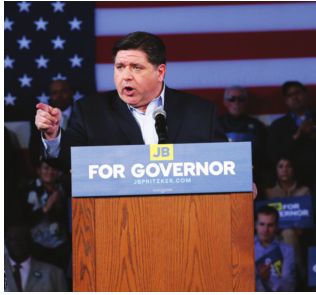Pritzker tackles taxes
The legislature convenes next month, and so Shiny Balloon Season is nearly upon us.
As any first-year law school student knows, shiny balloons are pretty but insubstantial things floated to distract scrutiny from things that actually matter. This time, the new governor’s push for a progressive income tax threatens to be a giant shiny balloon inflated to draw attention from the state’s inability to accomplish stuff worth accomplishing and that might, finally, be within reach, if the General Assembly – and yes, that means you, Democrats – would grow a pair.
We have the second-highest property taxes in the nation, sales taxes aren’t far behind and lawmakers keep passing unbalanced budgets. Meanwhile, people are stampeding for other states, saddling fewer and fewer taxpayers with bigger and bigger fiscal messes, not the least of which is an unfunded pension obligation that’s something north of $130 billion.
We have, according to any number of think tanks across the political spectrum, a horrible tax system. The Institute on Taxation and Economic Policy, a liberal-leaning group that likes progressive income taxes, says that Illinois has the eighth-most regressive tax system in America. To be sure, a progressive income tax seems fairer than the flat tax rate enshrined in the state constitution. But, being in the constitution, the flat tax isn’t easy to eliminate.
First, three-fifths of the legislature must agree to put it to a public vote. That’s not so huge a hump now as before Democrats added to majorities in the General Assembly, but it is still a hump – Democrats who want a progressive tax can afford three defections in the House and four in the Senate. Then voters must approve, which would, likely, be a bigger hump, particularly since the governor-elect and his allies haven’t said what rates folks of any given income level would pay, and don’t hold your breath waiting for such details.
Trust politicians who got us into this pickle to find Jesus and tell us what we’re really voting for? That’s not so much a hump as a Hail Mary, and there will be no shortage of well-financed fear mongers to fill in blanks, truthfully or otherwise, that lawmakers leave. There’s also the matter of legislators who want to keep their jobs appearing on the 2020 ballot at the same time as a tax overhaul proposal. Woo hoo.
Assuming that the General Assembly puts the question on the ballot and voters approve, legislators couldn’t enact a progressive tax system until 2021, with the first tax bills arriving in 2022. And that’s if everything moves at legislative light speed. Would anyone be surprised if J.B. Pritzker and lawmakers, assuming voters OK’d a constitutional amendment, delayed an overhaul so that the first bills didn’t go out until 2023, when the governor and lawmakers wouldn’t be on the ballot? Or if everything fell apart and nothing changed?
While we wait and see, we’re stuck with a horrendous tax code that could be made much better much sooner, and it isn’t complicated stuff. We don’t tax services. We don’t tax retirement income, no matter how much retirees make. We tax everyone and everything else to the breaking point, unless you’re Sears or some other corporation that has the means to chisel out special deals while the state’s fiscal hole remains just that.
Making things better isn’t complicated, but it does require a certain, even teensy, amount of courage and honesty that’s hard to find at the Capitol. Regardless of political persuasions, economists agree that the best tax systems spread the burden as much as possible, with low rates and lots of folks paying. That’s both fair and prudent. If tax revenue from one sector of the economy tanks, another can pick up the slack. In Illinois, if tax revenue slumps, we go back to the same wells. Ask shoppers at Legacy Pointe who are facing the highest sales taxes in the state.
If we taxed services and retirement income above $50,000, we could reduce rates, both for sales and income taxes, assuming Democrats renounce tax-and-spend traditions. Lowering rates would help sell a progressive tax at the ballot box. And, even if voters reject a progressive tax, we’d still be better off.
You gotta dance with the partner you’ve got, and, in this case, the partner is a flat tax. Bruce Rauner blew it by being Bruce Rauner, holding his breath, waiting for a dance partner, until the state turned blue, and just when the GOP had an opening. If he’d been just a little less ideological, Rauner would be picking out a new suit for his second inauguration. Pritzker would do well to remember that.
A progressive-tax-or-bust way of thinking is reminiscent of the “landmark’ pension bill of 2013, which passed just in time to sideline pension issues for the 2014 election. The pension fix proved phony as the state Supreme Court after the election pointed out what any sixth-grader could understand: What part of the constitution’s ban on reducing pension benefits don’t you understand?
Pritzker has made a lot of promises, and promises cost money. He needs to come up with a way to pay for them other than betting on a progressive tax that may or may not happen.
Contact Bruce Rushton at [email protected].
Editor’s note
A
journalist friend is exploring new models for the news, looking for
ways to rebuild trust with audiences, while working toward better
writing and reporting, while seeking new and better ways to make the
enterprise pay. At Illinois Times we’re eager to join the conversation,
looking for better ways to do what we do. At the same time we keep on
putting out a little paper, week after week, month after month, year
after year. That’s our model. –Fletcher Farrar, editor and CEO